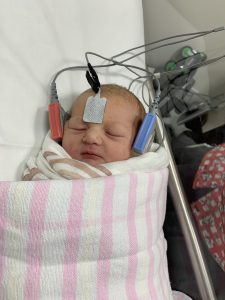
In most cases a trained hearing screener will test your babies hearing in hospital following birth. If you have your baby at home, or go home not long after the birth, you will be contacted by the SWISH Co-ordinator to arrange a time to test babies hearing.
A trained hearing screener will screen your baby when they are asleep or resting quietly. You are welcome to stay with your baby while the screen is being done. The screener will place small sensor pads on your baby’s head and play soft clicking sounds into the baby’s ears through an earphone. The sensor pads record your baby’s responses to the sounds. The screen usually does not unsettle the baby. The screen may take 10-20 minutes to complete.
As soon as the test is complete, your baby’s results will be explained and will be recorded in your baby’s personal health record (Blue book). Passing the test means your baby can hear whisper quiet noises in both ears.
Some babies will be referred directly to audiology assessment, even if they pass their initial test. This is because some babies are at increased risk of hearing loss, such as babies with cleft palates or Down Syndrome.
